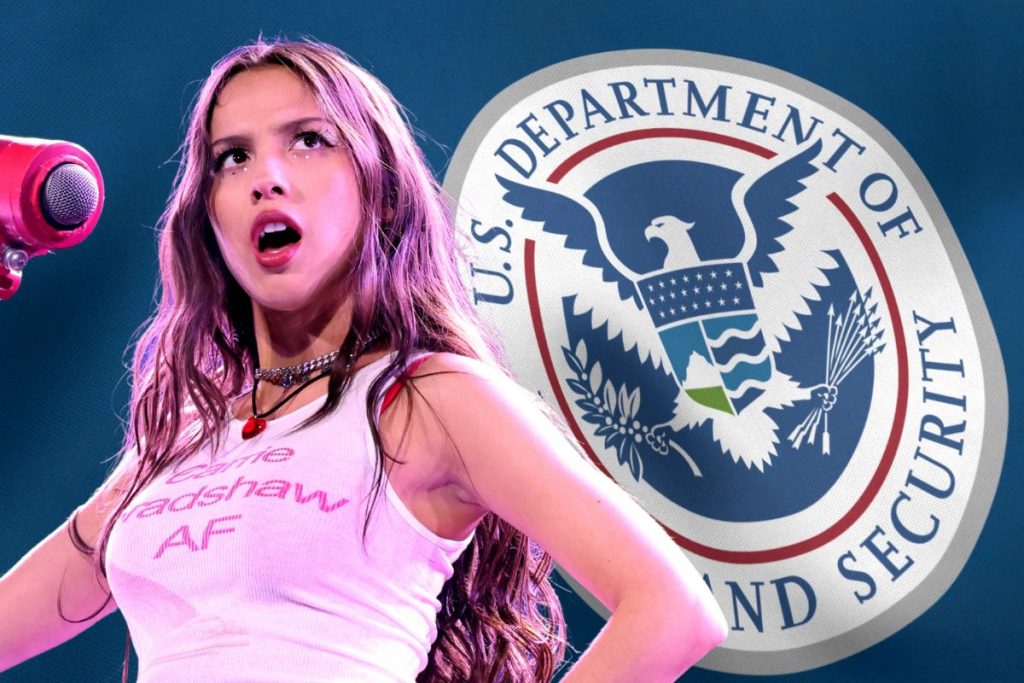Listen to the article
Rodrigo Joins Growing List of Musicians Protesting Unauthorized Use of Music by Trump Administration
Pop star Olivia Rodrigo has publicly condemned the Trump administration after her song “All American B-tch” was featured without permission in a deportation video shared on official government social media accounts.
The controversial clip, posted on both the Department of Homeland Security and White House Instagram pages, showed Immigration and Customs Enforcement (ICE) agents arresting and deporting undocumented immigrants while Rodrigo’s track played in the background. Text overlaid on the footage read: “LEAVE NOW and self-deport using the CBP Home app. If you don’t, you will face the consequences.”
Rodrigo responded forcefully in a now-deleted comment captured by entertainment news outlet Deadline: “Don’t ever use my songs to promote your racist, hateful propaganda.” Following the backlash, officials removed the song from the video.
The incident highlights growing tensions between the entertainment industry and the Trump administration, which has repeatedly found itself at odds with musicians over unauthorized use of their work.
Music licensing experts note that government agencies, like other entities, must obtain proper permissions before using copyrighted material in official communications. The unauthorized use of music in political contexts can create false impressions of artist endorsement while potentially violating copyright laws.
Just weeks earlier, legendary singer-songwriter Kenny Loggins voiced similar objections when the administration used his 1986 hit “Danger Zone” in a video featuring a digitally altered “King Trump” flying an F-18 fighter jet. The clip depicted Trump wearing a crown while piloting an aircraft with “King Trump” emblazoned on its side, eventually dumping what appeared to be waste on protesters holding “No Kings” signs.
Loggins responded with a public statement distancing himself from the content: “This is an unauthorized use of my performance of ‘Danger Zone.’ Nobody asked me for my permission, which I would have denied.” He demanded the immediate removal of his recording from the video.
The Grammy-winning artist further explained his opposition, saying he “couldn’t imagine anyone wanting his music used or associated with anything created with the sole purpose of dividing the country.” Loggins added, “Too many people are trying to tear us apart, and we need to find new ways to come together. We’re all Americans, and we’re all patriotic. There is no ‘us and them’ – that’s not who we are.”
Music industry analysts point out that these incidents reflect a broader pattern. Throughout both Trump administrations, artists including Rihanna, Pharrell Williams, R.E.M., Neil Young, and the Rolling Stones have issued cease-and-desist orders or public statements opposing the use of their music at rallies or in campaign materials.
The recurring controversies highlight the complex intersection of politics, copyright law, and artistic expression. While political campaigns can sometimes obtain licenses through performance rights organizations for rally music, using recordings in videos typically requires direct permission from rights holders.
For Rodrigo, whose music often resonates with younger voters, the unauthorized use of her work represents a particularly sensitive issue. The 21-year-old artist has previously used her platform to support progressive causes, making the association with deportation policies especially problematic from her perspective.
As the administration continues implementing stricter immigration enforcement measures, the conflict with Rodrigo underscores the broader cultural divisions that often emerge when politics and entertainment collide in today’s highly polarized media environment.
Fact Checker
Verify the accuracy of this article using The Disinformation Commission analysis and real-time sources.




10 Comments
This seems like a clear-cut case of copyright infringement. The Trump administration should have obtained proper licensing before using Rodrigo’s music, regardless of their political agenda. Musicians deserve to be compensated and have their creative work respected.
Hopefully this incident encourages the government to be more mindful about securing permissions for the use of copyrighted material in the future. Artists shouldn’t have to constantly fight against unauthorized use of their work.
I’m curious to know if there will be any legal consequences for the Trump administration’s actions. Unauthorized use of an artist’s music is a serious issue that needs to be addressed, especially when it’s being used for political purposes that the artist disagrees with.
Rodrigo was right to speak out and demand the removal of her song from the deportation video. Artists should have the final say over how their creative work is used, even by government entities.
I’m glad to see Olivia Rodrigo taking a strong stance against the unauthorized use of her music by the Trump administration. It’s crucial for artists to assert their rights and prevent their work from being co-opted for propaganda purposes.
This situation underscores the importance of clear licensing agreements and the need for the government to respect intellectual property rights, even when it comes to using music for political messaging.
I’m disappointed to hear about the Trump administration using Olivia Rodrigo’s music without permission. Artists should have control over how their work is used, especially for political messaging that they disagree with.
It’s good that Rodrigo spoke out forcefully against this unauthorized use of her song. Artists have a right to protect their intellectual property and prevent it from being used for propaganda purposes.
This incident highlights the ongoing tensions between the entertainment industry and the Trump administration over the use of music. It’s important for artists to protect their intellectual property rights and prevent their work from being exploited for political gain.
I hope this case sets a precedent that the government can’t simply use copyrighted material without permission, even if they claim it’s for a political purpose. Artists deserve to have their creative rights respected.